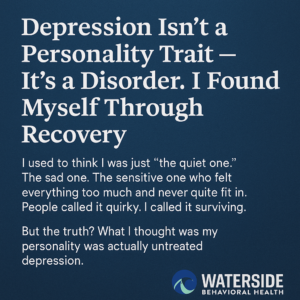I used to think I was just “the quiet one.” The sad one. The sensitive one who felt everything too much and never quite fit in. People called it quirky. I called it surviving.
But the truth? What I thought was my personality was actually untreated depression.
I Didn’t Know I Was Disappearing
When you live with depression long enough, it starts to feel like it is you. You can’t tell where the symptoms end and your identity begins. I didn’t even notice I’d stopped laughing at jokes. That I was flinching every time my phone rang. That every “I’m fine” was covering a slow fade into nothingness.
I wasn’t lazy. I wasn’t broken. I was sick.
And sickness doesn’t define you. But it can shape how you see yourself until it’s all you see.
The Lies I Believed About Myself
Depression doesn’t just drain your energy—it rewrites the story you tell about who you are.
- I thought I was bad at relationships. I wasn’t. I was just too numb to connect.
- I thought I had no ambition. I wasn’t unmotivated—I was exhausted from holding it together.
- I thought I was boring. But depression had turned the lights off inside me.
Eventually, I stopped questioning it. I stopped hoping for something better. I figured this was just how life felt for everyone and that some people were just better at hiding it.
But deep down, I was grieving someone I had never gotten to be: me, without depression.
What Recovery Actually Looked Like (Spoiler: Not What I Expected)
Starting therapy felt weird. Like handing over the keys to my brain and hoping someone didn’t judge the mess inside.
But here’s what I found at Waterside Behavioral Health:
- Real people who listened.
- Real strategies that helped.
- Real space to untangle the knots inside me without shame.
In depression therapy, they didn’t try to “fix” me. They helped me find me underneath the depression. It wasn’t quick. It wasn’t always pretty. But for the first time in years, I started recognizing myself.
I laughed out loud in session one day and cried afterward—not because I was sad, but because I hadn’t heard my own laugh in so long.
Therapy taught me how to:
- Recognize depressive thought patterns as symptoms, not truths
- Set boundaries with my inner critic
- Rebuild daily routines that made space for healing
- Stop apologizing for existing
And maybe most importantly, it taught me I was allowed to want more. Not just to survive, but to want.
If You Think This Is “Just Who You Are”—Please Rethink That
Depression lies in your own voice. It sounds like you, but it’s not you.
If any part of you suspects that maybe, just maybe, this isn’t your real self—that maybe the fog could lift—that’s enough. You don’t need a rock bottom. You don’t need a perfect plan.
You just need a place to start.
Waterside Behavioral Health is that place for so many of us in Plymouth, PA who thought we were too far gone or too “different” to get better.
You don’t have to explain why you feel the way you do. You just have to show up, exactly as you are.
You’re Not the “Weird One.” You’re the Brave One.
I used to believe I’d always be on the outside looking in. That I was built wrong.
But the truth? I wasn’t broken—I was buried. And therapy helped me dig myself out.
And maybe that’s you, too. Maybe you’ve been quietly surviving, calling it your personality, when really, it’s pain you were never meant to carry alone.
Recovery isn’t about becoming someone else. It’s about reclaiming who you were before depression convinced you you didn’t matter.
You matter.
You always did.
FAQ: Depression Therapy in Plymouth, PA
Is depression therapy just talking about my feelings?
Not at all. While talking is part of the process, effective depression therapy includes practical tools, emotional support, and sometimes structured approaches like CBT or DBT to help you reshape thought patterns and daily functioning.
What if I don’t know what to say in therapy?
That’s okay. A good therapist knows how to guide the conversation. You don’t need to have the right words—you just need to show up.
How long does it take to feel better?
It varies for everyone. Some people feel relief within weeks; for others, it’s more gradual. What matters is consistency and finding a provider who really fits.
Is therapy worth it even if I’ve tried before?
Yes. Just like not every shoe fits every foot, not every therapist or approach will click. If you’ve tried before and didn’t feel helped, that doesn’t mean therapy can’t work—it means you hadn’t found the right match yet.
Does Waterside Behavioral Health accept insurance?
Yes. We work with many major insurance providers and can help you verify your benefits quickly.
Ready to Take the First Step?
Your personality isn’t the problem—depression is. And recovery is real.
📞 Call Waterside Behavioral Health at (774) 619-7750 or explore depression therapy in Massachusetts now.
There’s more of you to meet—and we’d love to help you find them.





